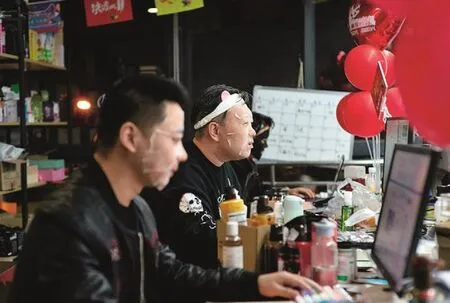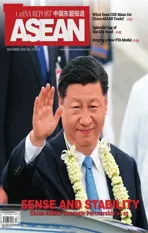CLICK AND CASH
2018-12-25ByHouWeili
By Hou Weili

A social media photo posted by Zhang Dayi, a high-earning Chinese online influencer.
Zhang Dayi, aged 30, has amassed quite a fortune using primarily her phone. Her apparel store on Taobao, China’s largest online marketplace, moved 600,000 pieces on a single day—November 11. In the last shopping spree, the massive sales bump pushed her sales revenues up to 170 million yuan (US$24.4 million).
Her business was hardly planned.Formerly a print fashion model, she became widely known for sharing how she mixed and matched outfits through posts on Sina Weibo, the Chinese equivalent of Twitter. Many of her posts went viral. By 2014, she had amassed some 300,000 followers on the social media platform.
Her Weibo account and its following became a life-changing asset. That year, she launched an online store in an attempt to cash in on her huge internet influence. The venture has been overwhelmingly successful. In just four years, Zhang’s Taobao store’s sales has grown to 1 million yuan a month, mostly driven by the 9.7 million loyal followers she has amassed. Zhang launched her own makeup brand, Big Eve, this June, which reaped 8 million yuan in sales in just one month.
Zhang’s story is typical of the new class of influencers in the digital world, most of whom have managed to transform their followers’ attention into personal wealth. Chinese online influencers,wanghong in Chinese, usually post their thoughts, videos and pictures about their daily life—always fancy and luxurious. Then, they converse with fans on the benefits and results of using certain products. Many are inevitably swayed into clicking a link to purchase.
Zhang’s earnings are just the tip of the iceberg in the fast-growing influencer economy in China. A recent report by iResearch, a marketresearchfirm focused on internet businesses, showed that 580 million Chinese users follow opinion leaders in the digital world. Such a massive group of people wields mind-boggling purchasing power. In 2015, a valuation of the influencer economy measured an astonishing 1.1 trillion yuan(US$158.1 billion), up 47.3 percent from the previous year, according to the report. After maintaining steady growth over the past three years,the market valuation is expected to surpass 2 trillion yuan (US$287.4 billion) by the end of this year.
Monetizing a Following
“Online influencers are capitalizing on the development dividends brought by the rise of social media and fast-growing e-commerce in China,” remarked Lu Ming, a Beijing-based analyst on internet businesses. “The newgeneration consumers, led by people born in the 1990s, establish social relations on the internet based on diverse individual interests. From an advertising standpoint, the opinions of influentialfigures in the digital community are exponentially more effective than conventional advertisements. This puts online influencers in a perfect position to cash in big on the clout they have gained in the digital world.”
Tian Yuan, a Communication Law Ph.D. working at the Communication University of China, echoed Lu’s sentiments from the perspective of communication laws. “These wanghong are not just taking the products straight to their followers,but integrating them with a highly attractive set of personalized values, lifestyles and consumption methods,” noted Tian. “The brands become part of their personalities.People tend to seek a sense of identity and belonging in the community,where people gather to share similar values. Wanghong play the role of key opinion leaders in their respective virtual communities.”
Consequently, he believes the core competitiveness of online influencers is their ability to produce content.“Online users arefirst attracted by the content, which leads to the products contained in it. Content serves as the bridge connecting consumers with products.”
The iResearch report showed that the 23-and-under demographic is the dominant group of online consumers. Of the 580 million followers, 53.9 percent are aged under 25, said the report. “They regard wanghong as fashion leaders,”opined Lu.
In fans’ eyes, emulating the lifestyle of a fashion leader is an attainable goal, which is a key reason they pay for the products influencers recommend.“Zhang Dayi is not exceptionally beautiful for a movie star—she looks like someone I could be friends with,and she looks like someone I could look like if I just had her outfits and makeup,” illustrated Feng Jing, a recent graduate currently employed as an administrative assistant at a Beijingbased private company. She spent over 1,000 yuan (US$143.7) this summer at Zhang’s Taobao store. “Zhang represents fashion and personality,and the clothes and makeup in her store are affordable for me.”
Not a Single-Soldier Fight
A company named Ruhnn Group has been an indispensable piece of Zhang’s success in monetarizing her digital clout. Starting as a women’s wear brand on Taobao,Ruhnn Group has transformed into a leading incubator of wanghong in China. Alongside training aspiring young girls in photography, makeup,original content production and online store management, such incubators help wanghong girlsfind endorsements and support their online stores with a complete industrial chain including services such as manufacturing and logistics.And, of course, they take a healthy cut of the earnings.


A retailer sells pearls on Taobao by livestreaming in Shaoxing, eastern China’s Zhejiang Province.

Employees of an influencer incubator based in Hangzhou promote masks to online customers.
In 2016, Alibaba Group Holding Ltd bought 9.58 percent of Ruhnn’s shares for 300 million yuan (US$43.1 million),increasing the founder’s personal wealth to 1.25 billion yuan (US$179.6 million). Ruhnn claimed it has nurtured about 100 fashion online influencers,and that its valuation reached 3.1 billion yuan (US$445.6 million) in 2017. The huge market potential has attracted many tech startups to race for a share by discovering and nurturing the next Zhang Dayi.
But the business is not as easy and lucrative as it might seem. Earlier this year, Ruhnn released a notice to apply for delisting from the stock market as “a decision in line with the company’s strategic plan.” However,the latest reports have cited sources stating that Ruhnn’s true intention is to seek an IPO in the U.S. in 2019.
Speculation aside, Zhang Dayi encountered real trouble with her Taobao store when internet users began criticizing her for infringement of the intellectual property of established fashion brands and complaining about poor product quality. “The clothes are not actually as great as she makes them out to be,”a customer named Hu complained.“They are not worth the price.”
“The problems deserve attention,and they remind wanghong and incubators behind them that the products and services are the core of their businesses,” Lu Ming said.“When the e-commerce dividends disappear, what matters is the value businesses are capable of creating.Influencers should constantly explore new business models as ways to nurture other competitive brands,” he suggested, calling for better regulation of online business and strict discipline in the sector to create a favorable environment for sustainable growth.
